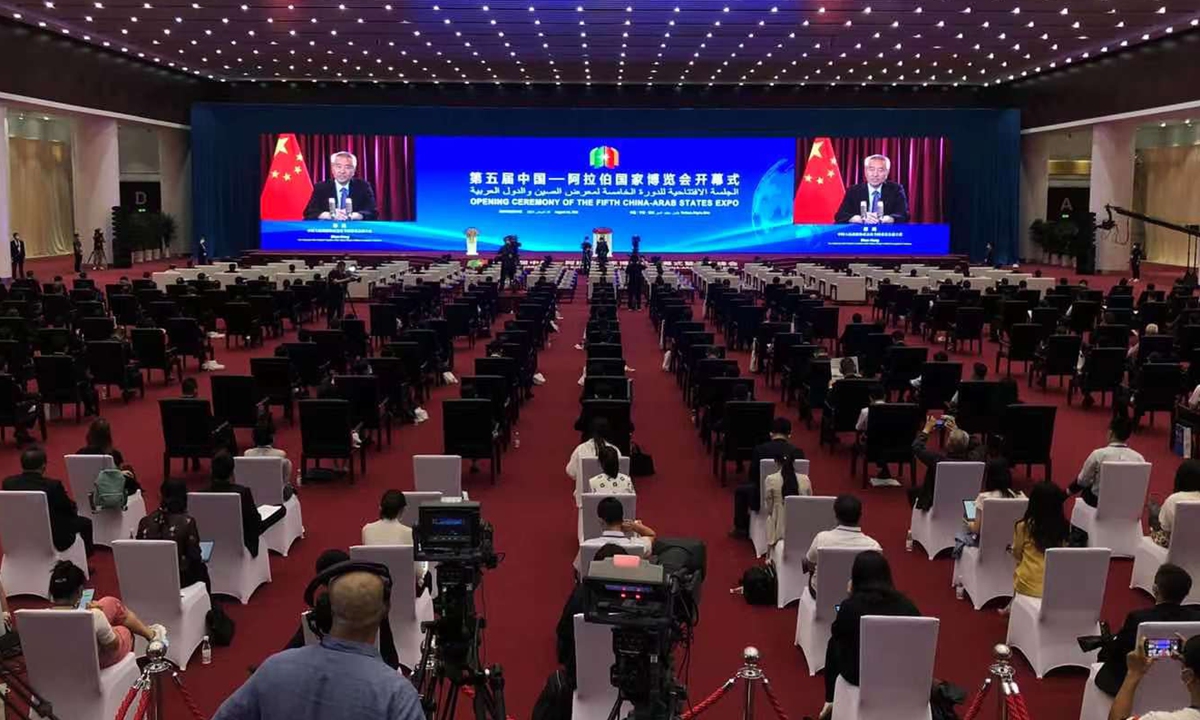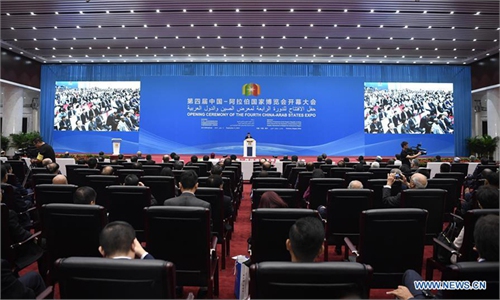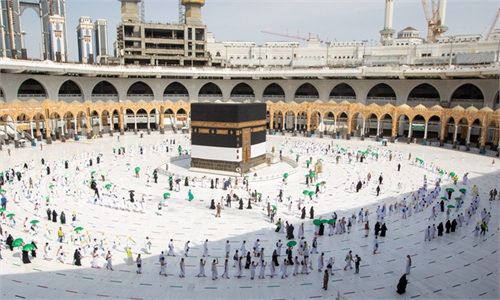China, Arab States eye closer economic ties at major expo
Clean energy, advanced technology among bilateral growth accelerators

Photo: Li Qiaoyi/GT
China and Arab countries need more than ever to forge closer ties amid a confluence of challenges, including the COVID-19 pandemic and headwinds for economic globalization, government officials and business executives from both sides said on Thursday at the opening of the fifth China-Arab States Expo.
The expo in Yinchuan, capital of Northwest China's Ningxia Hui Autonomous Region, was held as planned despite the fallout of recent virus flare-ups, a fresh example of China's economic resilience as the country eyes an expansion in trade and investment that also matters significantly for recovery-seeking Arab states, they noted, citing clean energy and advanced technology among bilateral growth accelerators.
China remains the largest trading partner of Arab countries. In the face of COVID-19, China and Arab countries have joined hands to fight the pandemic, setting an example of helping each other and overcoming difficulties together, Chinese President Xi Jinping said in a congratulatory letter sent to the expo on Thursday, according to the Xinhua News Agency.
Xi said that China is ready to work with Arab states to seek cooperation and development, promote peaceful development, achieve mutual benefit and win-win results, jointly build the Belt and Road Initiative (BRI) with high quality, elevate the China-Arab strategic partnership to a higher level, and jointly build a China-Arab community with a shared future for the new era.
China has built a moderately prosperous society in all respects and has embarked on a new journey toward building itself into a modern socialist country in all respects. Accordingly, the country is set to actively push for a dual circulation growth paradigm, with the domestic market as the mainstay while having domestic and international circulation reinforce one another.
Meanwhile, Arab countries are ramping up the regional economic recovery, necessitating stronger cooperation between the sides more than ever, Shao Hong, vice-chairman of the National Committee of the Chinese People's Political Consultative Conference (CPPCC), said in a speech via video to the expo.
Two-way investment ranges from oil and natural gas to architecture, and to manufacturing, logistics and electricity, according to Shao, noting that China aims for greater cooperation with Arab countries in such fields as high-tech, financial investment, data security and energy.
China would support and guide the involvement of Chinese companies and financial institutions in relevant countries' economic construction, striving to make the BRI a road toward cooperation, recovery and growth, Shao continued.
Chinese products, technologies and standards are being increasingly recognized in the Arab world, he remarked.
Bilateral trade hit $239.4 billion in 2020, with China's crude oil imports from Arab countries totaling 250 million tons, accounting for half of its imports.
Arab states' imports from China rose 2.1 percent year-on-year to $122.9 billion.
On the investment front, China's outstanding direct investment in Arab states had hit $20.1 billion by the end of 2020, while Arab nations' investment into China had amounted to $3.8 billion.
Progress on the long-anticipated free trade deal between China and the Gulf Cooperation Council (GCC) was also highlighted at Thursday's event.
China stands ready to actively press ahead with negotiations on the China-GCC free trade agreement, according to the CPPCC's Shao, hoping for the deal to yield substantial results as soon as possible.
China and the GCC announced the launch of free trade agreement negotiations in July 2004.
"Up to now, the two sides have held five rounds of negotiations and have reached agreement on the majority of issues concerning trade in goods. Negotiations on trade in services are also being launched," read an overview of the deal revealed by the Ministry of Commerce.
The deal, when reached, would give a shot in the arm to bilateral trade and investment, Huang Minxing, a prominent professor in Middle East studies at Northwest University, told the Global Times on Thursday.
China-Arab cooperation has remained unfazed by a continuation of tensions between China and the US, he said, citing the still strong footprint of Chinese tech conglomerate Huawei in Arab states.
In addition to the traditional focus of bilateral cooperation, energy, broad-based technological cooperation that allows for Chinese tech giants to play a part in digitalizing the Arabian economies has increasingly been in the limelight.
A stepped-up push for digital infrastructure construction helps in deepening China-Arab ties, Guo Ping, Huawei's rotating chairman, said at the Business Summit of the expo.
"Last year, the Saudi government issued national digital and artificial intelligence strategies, and we are pleased to witness cooperation between Saudi Arabia and many of the Chinese technology giants worldwide, such as Huawei," said Mohammed Al-Ajlan, deputy chairman of Ajlan & Bros Holding Group and chairman of the Saudi Chinese Business Council, stressing his willingness to strengthen collaboration in notably the digital economy with Chinese firms.


